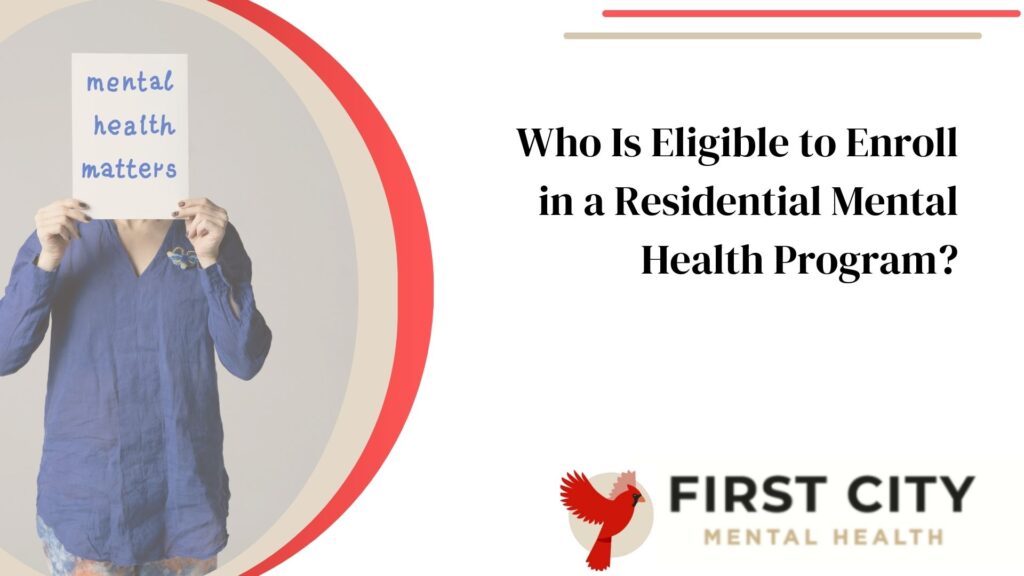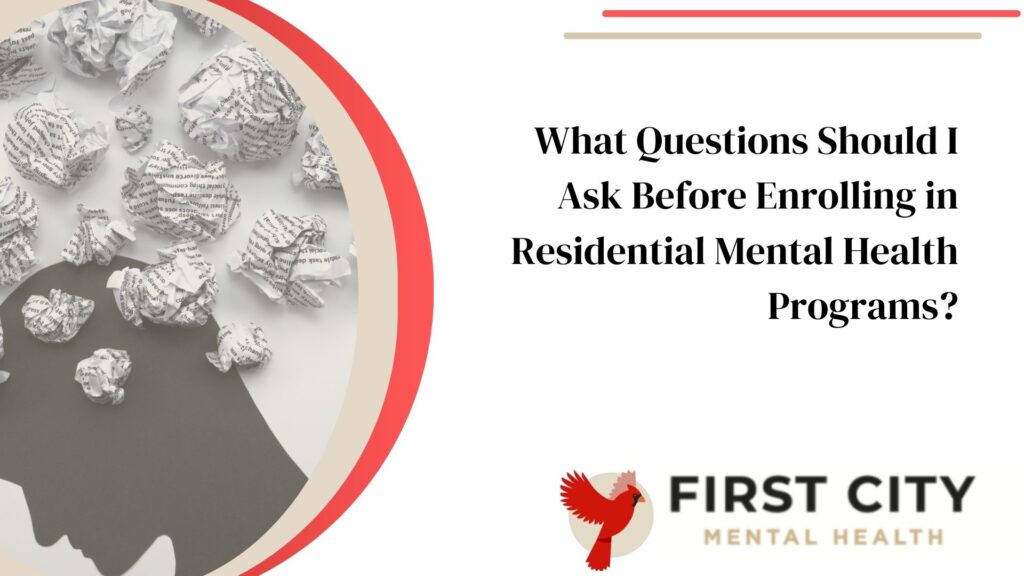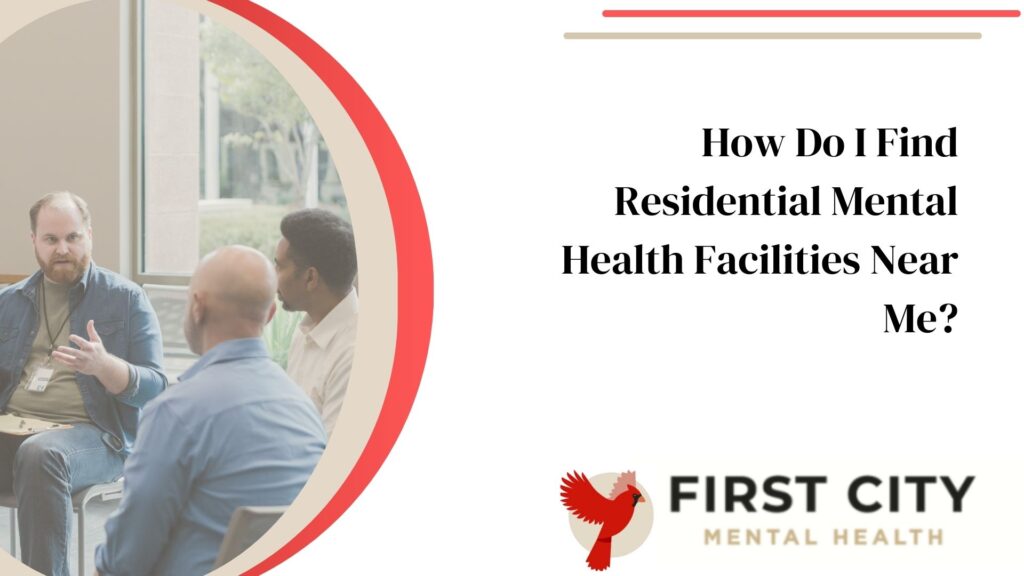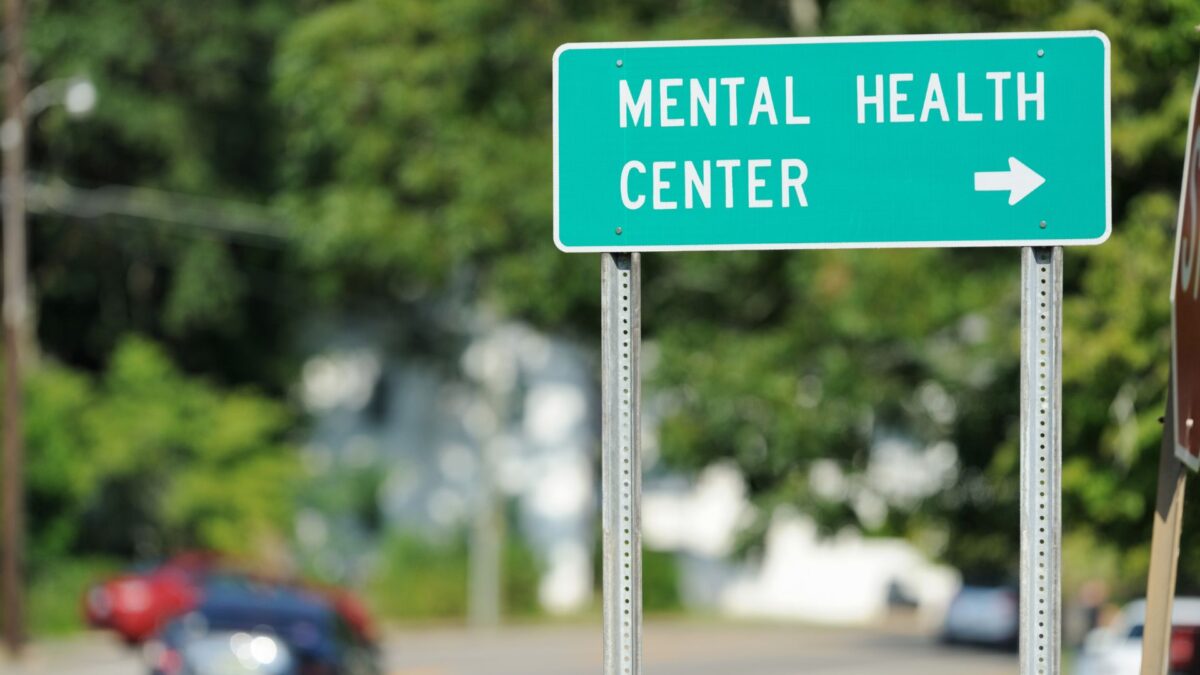
How to Find an IOP in Indianapolis?
January 15, 2025
How Does Residential Mental Health Differ From Outpatient Services in Indianapolis?
January 15, 2025Explore mental health facilities in Indianapolis with various services. Get the assistance you need with seamless appointments and referrals.
Facilities offer coping programs and resources for individuals and families. Coping with mental health issues doesn’t have to be a struggle; get help with care you can trust. Facilities in the city offer specialties tailored to diverse needs. Access to services makes sure people get the right fit. We prioritized support for mental well-being.
Key Takeaways
- Consider your individual needs to find the best residential mental health program for you. Learn about the program’s treatment approach and ensure it fits your individual goals.
- To qualify for residential mental health programs, you usually have to have a diagnosis of a mental health condition. In some cases, a referral from a healthcare provider is also required.
- The admissions journey typically begins with a first assessment. Next, you will fill out application forms and then go over your medical and mental health histories.
- Before enrolling in a program, ask about treatment methods. Learn about the qualifications of staff, success rates, and what support services they provide after treatment.
How Do I Choose the Right Residential Mental Health Program for Me?
Length of Stay
Programs can be short, lasting just a couple of weeks, or longer, lasting months. A longer stay might feel like a huge commitment, but it lets you fully experience your mental health journey.
Residential mental health Indianapolis programs do more than offer outpatient treatment. They allow people to dive deeply into treatments, experiment with different therapies, and focus entirely on the work of healing. You learn from experts who can take their time instead of hurrying you out the door. See what each program provides in terms of time. Then, see how it works with your unique needs and schedule.
24/7 Support
Another biggie is ensuring there is 24/7 support. You want to know that trained staff are always there, ready to step in whenever you need them. This is important because mental health challenges don’t keep a 9-to-5 schedule.
Whether it is a counselor, therapist, or nurse, having someone available around the clock allows you to have someone to turn to for immediate assistance. Assess if the program has sufficient trained professionals to fulfill these requirements. Ask what support is available after hours, too.
Tailored Programs
Scour the web until you find a program that truly gets what you’re experiencing. For example, if you’re struggling with obsessive-compulsive disorder or self-harm behaviors, seek out facilities that specialize in those issues. Some programs have a broad focus, and others zero in on specific issues. You’ll get better personalized care when a program tailors its services around your particular mental health needs. That increases the chances of positive results.
Staff Qualifications
The people who are going to help you matter a great deal. Check that the medical director and other key staff members are board-certified by the American Board of Psychiatry and Neurology. This certification is essential to ensure that they are knowledgeable in this area.
This certification demonstrates they have the rigorous training and skills to address complex mental health issues. Experienced staff can significantly improve treatment outcomes. It’s nice to know you’re in the hands of professionals who know what they’re doing. Feel free to ask about the team’s experience and qualifications. You can also look for reviews or testimonials from past patients.
Treatment Approach
Every program has its tricks up its sleeves. It’s essential to dig a little and see their treatment. Some may employ a significant amount of talk therapy, while others rely heavily on medication or holistic methods. Everything they do needs to make sense for you. If you thrive in group therapy, find somewhere that offers it. If you prefer one-on-one sessions, make them part of the package. Knowing the treatment style will help you feel more comfortable and confident in your choice.
Who Is Eligible to Enroll in a Residential Mental Health Program?

Regarding who can enter into a residential mental health treatment Indianapolis program, we need to consider the eligibility requirements these facilities impose. Learn about these requirements to make a good decision. These criteria ensure you or your loved one receives the right care and support.
Here’s what you should know:
- Facilities usually look for individuals who have a severe or persistent mental health condition that disrupts daily life. This includes conditions such as major depression, bipolar disorder, schizophrenia, or severe anxiety disorders. If your symptoms are too much to bear and you struggle to lead a normal life at home or work, consider your options. You may be a candidate for some extra help.
- Most programs cater to adults aged 18 and above, though some facilities might offer specialized support for adolescents. Read the age requirements for the program you’re looking at.
- While these programs aren’t cheap, many accept insurance plans. It’s essential to contact the facility and your insurance company to determine whether it will be covered and how much you will have to pay.
What Is the Admission Process for Residential Mental Health Facilities?
Understanding the Initial Assessment
When you first think about entering residential mental health facilities in Indianapolis, there’s usually an initial assessment. This is a big step, and it’s all about figuring out what you need. It usually starts with a call or a meeting. During this time, you’ll discuss what’s happening with a professional.
They’ll ask you questions to understand your mental health history. They want to hear about the symptoms you’re currently experiencing and any support you’ve received in the past. This allows them to see the big picture and determine if residential care suits you. Trained professionals do the assessment. They listen intently and dig up information while making you comfortable.
They may inquire about your medical history, medications, and any treatments you’ve tried. Be open and honest here because this helps them establish a plan that truly fits them. Don’t worry; everything you write here is kept confidential.
Documentation and Paperwork
Once the assessment is done, there’s usually some paperwork. This part may seem a little intimidating, but it’s easy. You’ll fill out forms including your personal information, insurance details, and some legal documents. Some facilities will require a doctor’s referral or your medical records. It’s wise to have these documents available when possible.
The paperwork is necessary to ensure everything is in order before you begin your treatment. If you have questions about any of the documents, the staff at the facility is there to help. They can walk you through the process and explain anything you need clarification on. This step ensures that the facility has all the right information to provide the best possible care for you.
Preparing for Admission
After the paperwork, it’s time to get ready for admission. This is the step to prepare to enter the facility and become acclimated. You’ll get a list of things to bring. This includes clothes, toiletries, and personal items that will make you feel more at home. Each facility has its own rules about what you can bring. Make sure to ask them in the first instance!
You may even get a chance to tour the facility before signing on the dotted line. I think this is really useful because it gives you an idea of the place and what to expect. You’ll visit the living quarters and meet some of the staff. You may even speak with other residents willing to share their experiences!
Orientation and Integration
As you begin your stay, there’s typically an orientation process. Here, you learn about the daily schedule and the types of therapies you’ll engage in. You’ll also learn about the facility’s rules. It’s an important time to ask questions and understand how everything works.
The staff will assist you in getting comfortable in your room and introduce you to other residents. Creating bonds with people who are experiencing the same thing can be helpful. Feeling a little intimidated at first is normal, but the locals and staff are friendly. They know what you’re going through and want to make you feel at home.
What Questions Should I Ask Before Enrolling in Residential Mental Health Programs?

What Does a Day Look Like in the Program?
If you’re thinking about entering a residential mental health treatment program to address a mental health issue, you’ll want to know what every day is like. The more you know, the better prepared you’ll be. They’ll also send you a copy of the program’s daily schedule. This gives you a glimpse of what a normal 24 hours is like for patients.
How Will My Insurance Work?
Understanding the financial aspect is the most important part of deciding whether to get treatment. Many treatment programs provide connections to third-party insurance advocates. These folks are pros at helping you navigate out-of-network benefits. If your favorite facility is out of your network, their help is a lifesaver!
What Types of Treatments and Therapies Are Available?
Everybody responds differently to different treatments. By understanding the available therapies, you can make a more informed decision about which program suits you best. If 12-step programs appeal to you, you can often find the facility’s treatment programs on their website. Look for options such as trauma-focused therapy or dual diagnosis treatment for substance use issues.
What Is the Typical Duration of the Program?
The length of time spent in a residential program can vary. Most clients spend 1 to 2 months in residential treatment. After that, they usually spend 1 to 3 months in nonresidential day treatment or intensive outpatient programs.
Can I Enroll in Residential Mental Health Care While Employed?
Understanding Employment Rights and Protections
If you consider signing up for residential mental health care, you may have questions about how it impacts your job. Fortunately, there are laws in place to protect you. In the U.S., the Family and Medical Leave Act (FMLA) entitles qualifying employees to take unpaid leave. This leave can be used for medical reasons, including mental health needs.
This means you can leave work for treatment without losing your job. Some states even have their laws that provide similar protections. For instance, in California, eligible workers can take protected leave even if their employer has fewer than 50 employees. It’s worth reviewing your local laws in case the same might apply to you.
Balancing Work and Mental Health Care
Juggling work with mental health care might seem tricky, but it’s doable. Many Indianapolis facilities offer flexible treatment schedules, which allow patients to get the care they need without sacrificing their livelihood. Facilities may offer evening or weekend programs, meaning you could still work during the day. You may also want to explore part-time or outpatient options, which are less disruptive to your work schedule.
Communication with your employer is crucial here. If safe, have an honest conversation with your manager or HR about what you need. You don’t have to offer specific details, but letting them know you’re getting treatment can help them support you.
Exploring Financial Assistance and Coverage
Financial concerns often arise when discussing residential care, but costs can be managed. First, find out if your health insurance covers mental health treatment. Many plans cover inpatient care. However, the details vary, so call your provider to determine what is included.
Some facilities offer sliding scale fees based on your income, so treatment doesn’t have to break the bank. You may also come across grants or financial aid programs dedicated to mental health care. Don’t hesitate to ask the facility about payment plans or discounts. They’re there to find a solution within your budget.
Finding the Right Facility in Indianapolis
The facility you choose makes all the difference on your journey to recovery with First City Mental Health. Indianapolis has a few excellent options, each with various programs and specialties. Identify what kind of care you require beforehand. Are you looking for a facility specializing in a particular area, such as trauma or addiction? Or maybe one that has holistic treatments such as yoga or art therapy?
Here are some steps to guide your search:
- Look for reviews and testimonials online. Websites like Yelp or Google Reviews may provide information about other patients’ experiences.
- Tour the facility. This helps you get a feel for the environment and see if it’s a place where you’d feel comfortable.
- Talk to staff about their programs, staff qualifications, and success rates. Ask how they integrate work and treatment, too.
How Long Do Residential Mental Health Programs Typically Last?
Residents’ Duration of Stay
On average, people stay for a few months to a full year. The length of time really depends on their situation. If you’re treating depression, you might go into best mental health facilities in Inidianapolis for a treatment program. You should expect to spend 30 to 60 days in this program for support and recovery. More severe depression can result in longer treatments.
If anxiety or substance use is also present, these stays may increase even further. For example, someone with both depression and anxiety might require more time to experience actual progress. For individuals living with bipolar disorder, the timeline can be stretched even further. You might see programs running 60 to 90 days or even longer here. The aim is not to cure mental illness but to stabilize moods and teach people ways to cope with life’s ups and downs.
How Do Residential Mental Health Programs Address Dual Diagnosis?
Structured and Supportive Environment
In residential mental health Indianapolis, you’ll see space punctuated by structure and support. It’s like having a safety net while you work through both your mental health disorder and addiction.
These programs are set up to deal with what’s known as dual diagnosis. You may be battling depression or anxiety, and in addition to all that, there’s substance abuse.
It can feel like too much to focus on both. These programs are built to help you get there. They also create a kind of environment where you can just focus on healing without the usual distractions or stressors of daily life.
How Do I Find Residential Mental Health Facilities Near Me?

Check Certification and Accreditation
When seeking treatment facilities for Indianapolis mental health, it is essential to inquire about their credentials.See if the location has the necessary provider certification. Check if it is licensed with the Indiana Family and Social Services Administration.
Think of this step like your safety net. It ensures the facility is legit and meets the state’s basic standards. It’s always nice to know that your favorite restaurant has passed the health inspector’s check. Now you’re ready to confidently dive into their menu!
Explore Programs and Services
Ensure the facility offers diverse programs and services. They should be able to meet your specific needs. This includes individual and group therapy, family therapy, and even recreational activities that promote holistic healing. Choosing a school is about more than just textbooks. You’re looking for a place that encourages growth in every aspect of your life.
There’s no harm in speaking to the facility directly. Ask all of the questions you have about their programs and services. Ask if they’ve worked with clients with requirements like yours. This step can give you a pretty strong idea of what your day-to-day is like there. You get a glimpse into the approach you (or your friend) will adopt. This is a key insight for peace of mind.
Conclusion
Think of this step as your safety net. It ensures the facility is legit and meets the state’s basic standards as mental health therapist Indianapolis. It’s always nice to know that your favorite restaurant has passed the health inspector’s check. Now, you’re ready to dive into their menu confidently! It can feel like too much to focus on both. These programs are built to help you get there. They also create an environment where you can focus on healing without the usual distractions or stressors of daily life.
Frequently Asked Questions
How Do I Choose the Right Mental Health Facility?
Credentials of research facilities, options for treatment, and patient reviews. Consider your own needs and ask professionals for advice. Visit the facilities so you can get a sense of the environment.
Who Can Benefit from Residential Mental Health Programs?
People who are experiencing acute mental health crises require highly structured care. It’s appropriate for patients who have attempted outpatient treatment with little success.
What is the Typical Admission Process for a Mental Health Facility?
It usually involves an over-the-phone assessment, paperwork, checking your and your family’s insurance, and a personal interview. Each facility may have its requirements.
Can I Work While in a Residential Mental Health Program?
Many programs provide flexible schedules that can work around a job. Call and inquire with the facility to find out their policies and support for working people.






